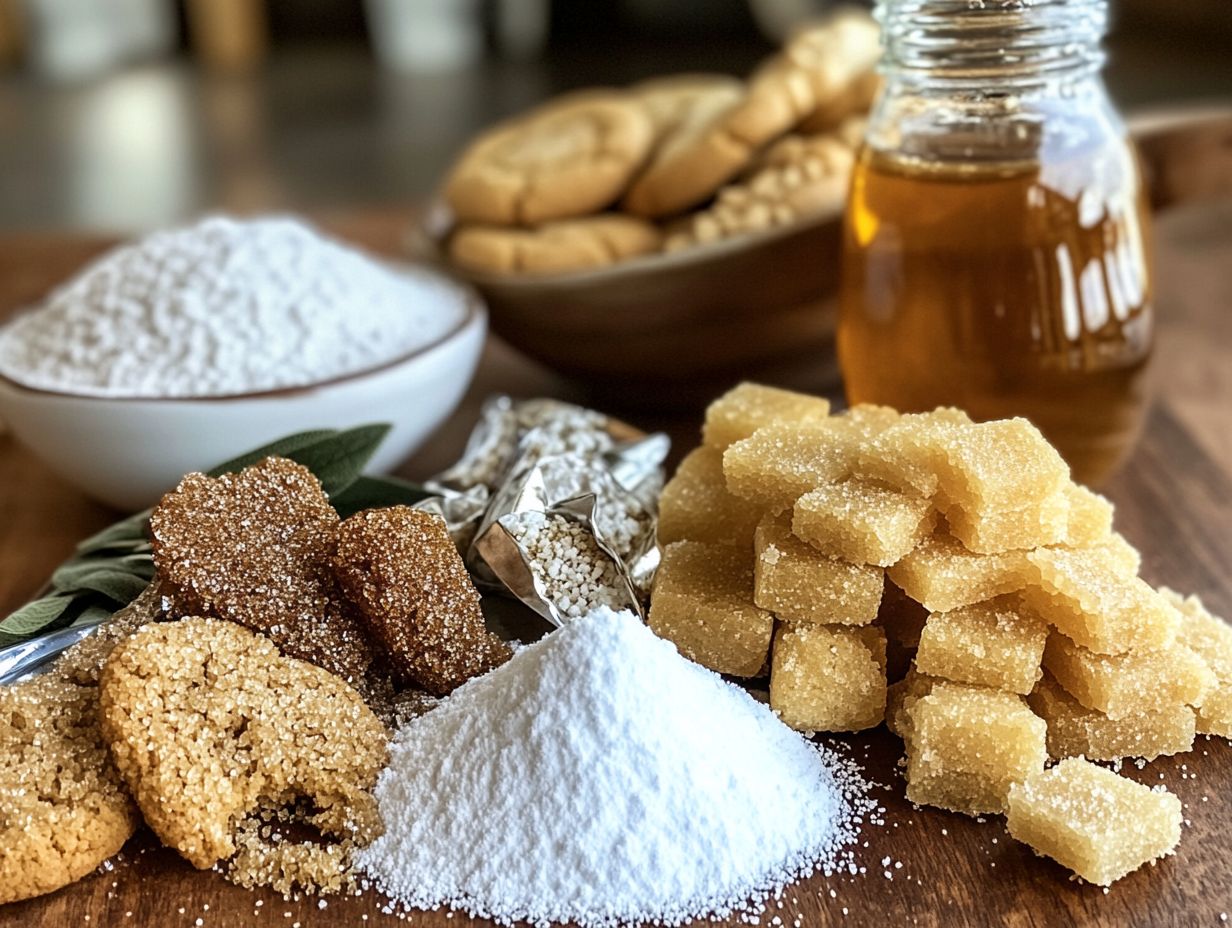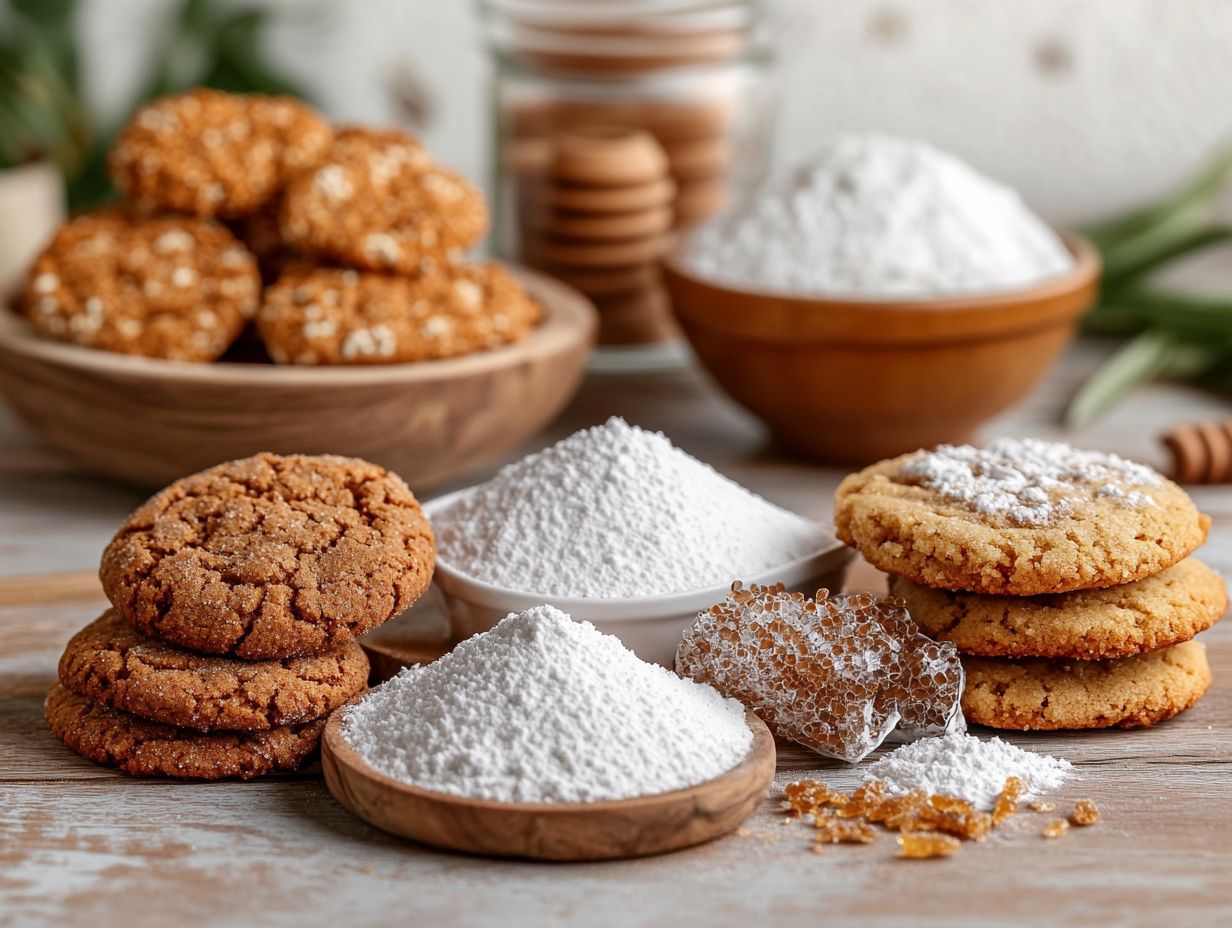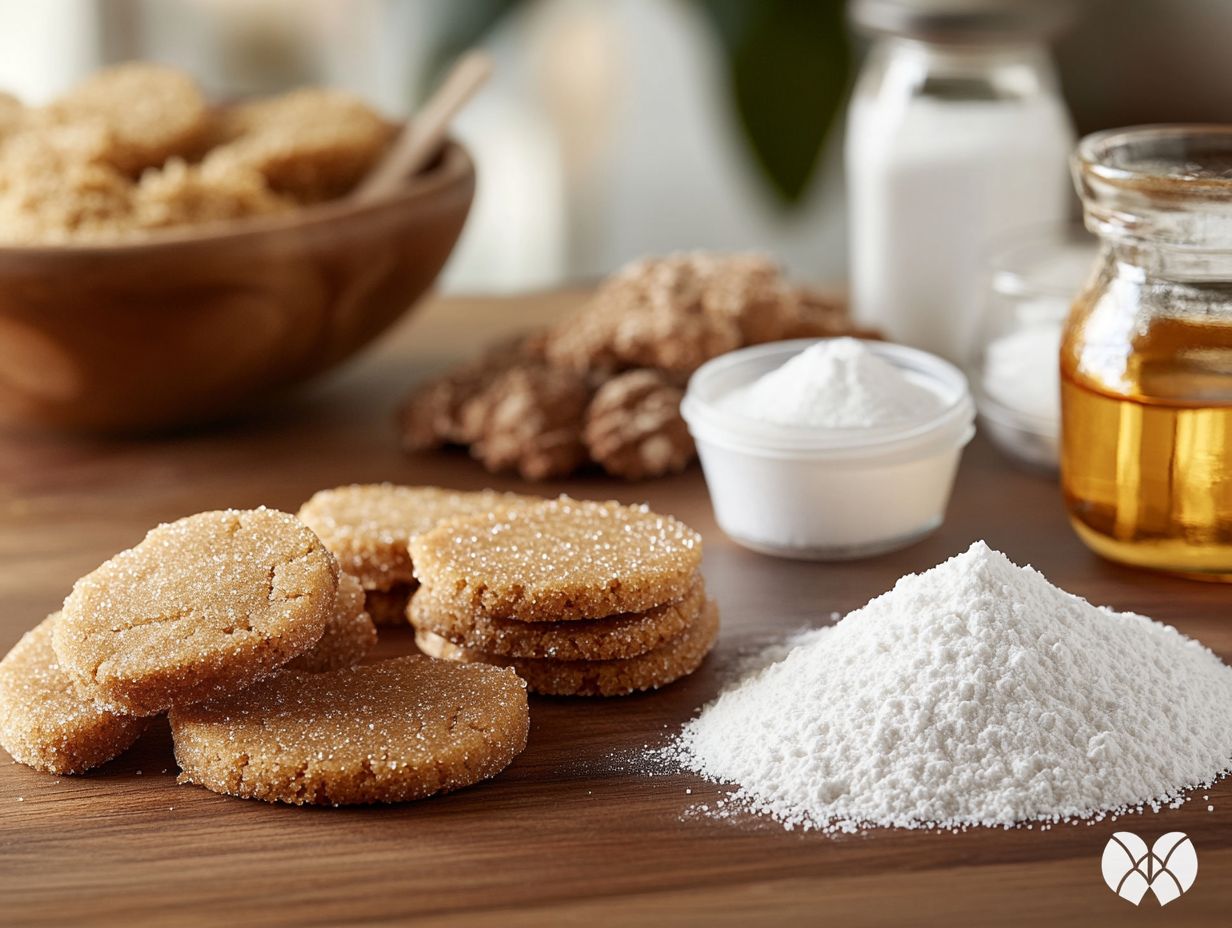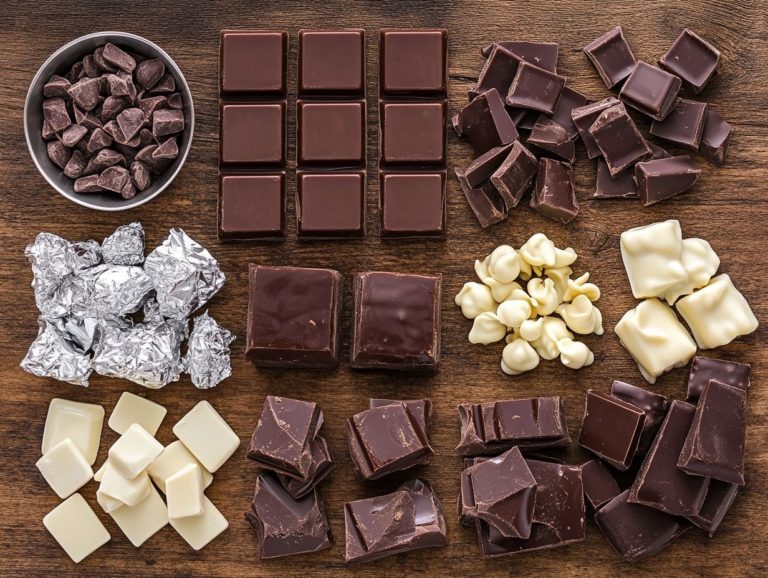How to Choose the Right Sweetener for Desserts?
Contents
- How to Choose the Right Sweetener for Desserts
- Key Takeaways:
- What Are the Different Types of Sweeteners?
- Which Sweetener Is Best for Baking?
- Natural Sweeteners: A Guide to Healthier Baking
- How Do Different Sweeteners Affect Blood Sugar Levels?
- High Glycemic Index Sweeteners
- Low Glycemic Index Sweeteners
- How to Choose the Right Sweetener for Your Desserts?
- 3. Be Mindful of Any Dietary Restrictions or Health Concerns
- Frequently Asked Questions
- What are some common types of sweeteners used in desserts?
- How do I choose the right sweetener for my dessert?
- Are natural sweeteners a healthier option for desserts?
- Can I substitute sugar with artificial sweeteners in dessert recipes?
- What are some low-calorie sweeteners I can use in my desserts?
- Are there any health concerns associated with artificial sweeteners?
How to Choose the Right Sweetener for Desserts
Sweeteners are essential for elevating the flavor of desserts. With a plethora of choices, including alternative sweeteners, picking the right one can feel daunting.
From natural options like honey, maple syrup, and fruit sweeteners to artificial substitutes and sugar alcohols, each category has unique characteristics and applications.
In this article, you ll discover the various types of sweeteners, examine their effects on baking, glucose levels, and blood sugar levels, and receive insightful tips to guide you in selecting the ideal sweetener for your next culinary masterpiece.
Key Takeaways:

- Consider the desired level of sweetness and sugar limits when choosing a sweetener for your desserts.
- Take into account the type of dessert you are making and the potential health risks when selecting a sweetener.
- Be mindful of any dietary restrictions, such as diabetes management or health concerns, including heart disease and obesity, when choosing a sweetener for your desserts.
What Are the Different Types of Sweeteners?
Understanding the different types of sweeteners is essential for making informed dietary choices, particularly with increasing concerns surrounding refined sugar and its health risks.
Recently, discussions have pivoted toward healthier alternatives that can satisfy your craving for sweetness without the drawbacks of added sugars and processed sugars.
Sweeteners can be classified into three main categories: natural sweeteners, artificial sweeteners, and sugar alcohols. Each category has its own set of benefits and potential downsides. This exploration invites you to delve into these categories, offering insights on how they can influence your sugar consumption and overall health while promoting a balanced approach to sugar intake.
1. Natural Sweeteners
Natural sweeteners, sourced from plants and whole foods, present enticing alternatives to refined sugar. They offer not just sweetness but also a host of nutritional benefits.
Options like coconut sugar, raw honey, maple syrup, monkfruit sweetener, date sugar, and agave nectar do more than just sweeten your dishes; they impart unique flavors and deliver health-boosting properties. These properties include vitamins and antioxidants that support digestive health and overall well-being.
These sweeteners are healthier choices and tend to have a lower glycemic index. This means they have a gentler impact on your blood sugar levels. For instance, coconut sugar boasts a glycemic index of 35, in stark contrast to the 70 of traditional table sugar. This makes it a smart option for anyone keeping a close eye on their sugar intake while aiming for healthy baking.
However, it s wise to remain conscious of portion sizes. Natural sweeteners still pack calories and can contribute to weight gain if overindulged. By incorporating them thoughtfully into a balanced diet, you can lower your overall sugar consumption while savoring the benefits of their natural origins.
Experimenting with these options in your cooking can lead to better health and flavor in your desserts!
2. Artificial Sweeteners
Artificial sweeteners, such as sucralose, have gained traction as popular sugar substitutes. They provide a sweet taste without the calories typically linked to traditional sweeteners. These calorie-free sweeteners, including brands like Swerve and Stevia, are found in various food products. They are often marketed as sugar-free alternatives and have become essential for many weight management and diabetes management plans because they help reduce sugar intake.
However, their widespread use has ignited significant debate among health experts and consumers alike. Different types of artificial sweeteners, including aspartame, saccharin, and stevia, are produced through various manufacturing processes, including chemical synthesis and plant extraction. While some studies suggest these substitutes can aid in caloric reduction, concerns linger about their long-term health implications, such as complications related to metabolism and other health hazards.
Research has suggested potential links between artificial sweeteners and metabolic disorders, which refers to conditions that affect how your body processes food. There are also concerns about altered gut microbiota the community of microorganisms in your intestines that help with digestion and even increased cravings for sugary foods, which could perpetuate a cycle of sugar addiction. It’s important to read food labels carefully to understand the types of sweeteners used in products.
As experts weigh the benefits against these risks, it becomes crucial for you to stay informed and thoughtful about your dietary choices.
3. Sugar Alcohols
Sugar alcohols, including erythritol, present a distinctive category of sweeteners that offer a lower-calorie alternative to traditional sugar. They exert minimal effects on glucose levels. Brands like Lakanto and Swerve have popularized these sugar alcohols, which are commonly found in sugar-free products. These sweeteners provide a delightful taste of sweetness without excessive calories, making them an appealing option for those managing their sugar intake. However, be mindful that overindulgence can lead to digestive discomfort.
These sweeteners operate by being partially absorbed in the small intestine, contributing fewer calories to your diet. Incorporating sugar alcohols can help prevent metabolic complications typically associated with traditional sugars, such as spikes in insulin and blood glucose levels. Their fiber-like characteristics also support gut flora and bolster digestive health, making them a wise choice for enhancing your nutritional intake. Remember, moderation is crucial it’s recommended to limit consumption to avoid gastrointestinal issues.
By swapping out regular sugars for these sweeteners, you can savor a sweeter taste in your foods and beverages without the accompanying caloric burden. This paves the way for a more balanced diet.
Which Sweetener Is Best for Baking?
Selecting the ideal sweetener for your baking endeavors can profoundly influence both the flavor and texture of your creations. It’s crucial to grasp the unique characteristics of each option available. With that understanding, you can explore various baking sugar substitutes for healthier and tastier outcomes.
While granulated sugar has traditionally been a go-to in the baking world, alternatives like honey, maple syrup, and agave nectar not only bring sweetness but also distinctive flavors that can elevate your recipes to new heights. Brands like Lakanto also offer innovative options such as monkfruit sweetener, which aim to provide a healthier sweetening experience.
Options like stevia and other sugar substitutes allow you to enjoy lower-calorie treats without sacrificing taste. These sugar alternatives often come with the added benefit of being suitable for individuals managing Type 2 diabetes or those aiming for overall sugar reduction.
1. Granulated Sugar

Granulated sugar stands as the quintessential sweetener in baking. It is cherished for its ability to elevate sweetness and contribute to the perfect texture of various baked creations.
Its distinctive properties strike a balance between moisture and structure. This makes it an essential ingredient in timeless recipes. However, be aware of its potential link to health risks like obesity and heart disease.
When you incorporate granulated sugar into your baking, it works wonders creating a tender crumb in cakes, delivering that delightful crispiness in cookies, and ensuring they maintain their shape while still being wonderfully soft and chewy.
As the baking process unfolds, sugar caramelizes, enriching your treats with deep flavors and an enticing golden hue. Its hygroscopic nature captures moisture, ensuring that your baked goods remain fresh for an extended period. This is key for making flavorful granola bars and other sweet foods.
Whether you’re crafting cookies, cakes, or muffins, granulated sugar is essential for achieving that sought-after texture and flavor profile. If you’re exploring alternatives, options like honey, maple syrup, or erythritol can serve as substitutes, but be mindful that they may slightly alter the consistency or flavor. You might find that some adjustments to your overall recipe are necessary to achieve your desired outcome.
2. Honey
Honey, the exquisite natural sweetener crafted by bees, adds delightful flavor and moisture to baked goods. It is a favored ingredient among discerning bakers.
Its composition elevates sweetness and provides health benefits like antioxidants and essential vitamins. For those exploring healthy baking and cooking tips, honey is a versatile and beneficial ingredient to incorporate.
When you decide to incorporate honey into your baking repertoire, substituting it for granulated sugar is a seamless task. Typically, you can use about half to two-thirds of a cup of honey for every cup of sugar. Just remember to reduce the liquid in the recipe by approximately one-fourth.
This remarkable sweetener does more than just sweeten; it enriches texture, resulting in a tender crumb that will elevate your creations. Plus, it adds a subtle floral note that enhances a variety of desserts.
Honey also boasts natural antimicrobial properties, lending an additional layer of health benefits to your culinary endeavors. This makes it perfect for smoothie recipes and other health-conscious dishes.
If you re managing your sugar intake, it s important to stay aware that honey is still a form of sugar and possesses a calorie count similar to that of granulated sugar. This calls for careful measuring and adjustments in your recipes to maintain the perfect balance.
3. Maple Syrup
Maple syrup is a delightful natural sweetener that enriches the flavor of your baked goods while keeping them wonderfully moist.
It serves as a fantastic alternative to granulated sugar, especially in recipes benefiting from its unique taste. With its ability to contribute to a lower glycemic index, maple syrup is a preferred choice for many aiming for healthier sugar alternatives.
When you decide to incorporate maple syrup into your baking, keep in mind that it s sweeter than refined sugar, so a little goes a long way. A good rule of thumb is to use three-quarters of a cup of maple syrup for every cup of sugar you re replacing.
Don t forget to reduce the liquid in your recipe by about two tablespoons to ensure the texture remains just right. For more baking tips and recipe ideas, keep experimenting with natural sweeteners to find your perfect balance.
Beyond its delicious flavor, maple syrup brings along valuable minerals like manganese and zinc, as well as antioxidants, making it a more nutrient-dense choice. This means you can indulge in your sweet treats with a bit more peace of mind, enjoying a healthier alternative while minimizing the downsides often linked to refined sugars.
Natural Sweeteners: A Guide to Healthier Baking
4. Agave Nectar
Agave nectar is a natural sweetener celebrated for its low glycemic index. It is an ideal choice for anyone looking to manage sugar levels while still indulging in sweetness during baking. With its mild flavor, it blends effortlessly into various recipes without overshadowing other ingredients.
This feature allows agave nectar to surpass some traditional sweeteners, like cane sugar and honey, which can cause significant spikes in glucose levels. It also boasts a higher sweetness potency compared to granulated sugar, so you need less to achieve the desired flavor profile.
When substituting in your recipes, a good rule of thumb is to replace one cup of sugar with two-thirds of a cup of agave nectar. While doing so, slightly reduce the liquid content since it adds moisture.
This versatility makes agave nectar an excellent choice for cakes, cookies, and even sauces. It appeals to both health-conscious bakers and those with a penchant for delightful sweet treats.
Now that you know about agave nectar, let s explore another sweetener: Stevia.
5. Stevia
Stevia is a popular sugar-free sweetener sourced from the leaves of the Stevia rebaudiana plant. It offers you a natural sweetness without the burden of calories that come with traditional sugars. Its remarkable sweetness means you only need a small amount, making it a beloved choice for those seeking to reduce their caloric intake.
When you decide to incorporate stevia into your baking, it is crucial to understand how to substitute it for sugar. Typically, one teaspoon of stevia extract can replace an entire cup of sugar. However, you may need to adjust based on the specific form you are using.
Some bakers encounter a lingering aftertaste with certain stevia products. This can be easily addressed by blending stevia with other natural sweeteners, enhancing the flavor profile of your baked goods.
Stevia is an exciting choice with amazing health benefits that can transform your baking! It is free of calories and carbohydrates, aligning perfectly with the preferences of the ever-growing sugar-free community. As its popularity continues to rise, many people find that experimenting with stevia opens the door to creating delightful desserts without sacrificing their health goals.
6. Sucralose
Sucralose is an artificial sweetener that has become quite the darling in the baking world. Its impressive stability at high temperatures and uncanny ability to mimic sugar’s sweetness make it a popular choice. You will often find it nestled among sugar alternatives, offering a practical solution for those looking to cut back on sugar while keeping flavor front and center.
When you incorporate sucralose into your recipes, you can achieve that coveted sweetness without the extra calories. It is an excellent choice for low-calorie or diabetic-friendly treats. Just keep in mind that adjustments are necessary; typically, you will need less than a tablespoon of sucralose to replace a full cup of sugar since it is about 600 times sweeter.
While sucralose has its perks, be wise to some health considerations. There can be potential digestive discomfort for sensitive individuals, and there are ongoing debates about its long-term effects.
Compared to natural sweeteners like honey or agave syrup, sucralose stands out as a zero-calorie option. However, some people argue that natural alternatives might offer additional health benefits, including vitamins and minerals. It is all about what aligns best with your taste and health goals.
How Do Different Sweeteners Affect Blood Sugar Levels?

The influence of sweeteners on blood sugar levels is a vital factor for you, especially if you are managing conditions like Type 2 diabetes or striving to prevent metabolic issues associated with excessive sugar intake.
Sweeteners are typically classified according to their glycemic index, reflecting how quickly they elevate blood sugar levels. Grasping these distinctions is crucial for you to make informed and health-conscious dietary decisions.
Start experimenting with these natural sweeteners today to create delicious, healthier desserts!
High Glycemic Index Sweeteners
High glycemic index sweeteners cause rapid spikes in blood sugar levels, making them less ideal if you want to manage sugar intake effectively. Think of refined sugars and highly processed sugar substitutes that significantly increase sweetness.
These sweeteners often lurk in sugary snacks and drinks, leading to swift increases in glucose levels. This prompts the pancreas to release insulin quickly, causing fluctuations in energy. It can even trigger a cycle of sugar cravings as you find yourself reaching for more sweet treats to combat those inevitable energy dips.
Regularly eating high-glycemic sweeteners can heighten your risk for insulin resistance a condition where the body doesn’t respond properly to insulin and metabolic disorders, which are serious concerns for long-term health. Understanding the impact of these sweeteners is crucial for making better dietary choices and keeping blood sugar levels stable.
Low Glycemic Index Sweeteners
Low glycemic index sweeteners are the optimal choice for anyone wanting to maintain stable blood sugar levels, especially if you have diabetes or prediabetes. These sweeteners provide sweetness with minimal impact on glucose levels, offering a healthier alternative to traditional sugars.
By adding low glycemic index sweeteners such as stevia, monk fruit sweetener, and erythritol to your diet, you can enjoy your favorite treats without worrying about sugar spikes. These alternatives not only help control blood sugar but also aid in reducing overall sugar consumption, which is essential for long-term health.
Stevia, derived from a natural plant, is known for its zero-calorie content, while monk fruit sweetener provides a unique flavor without raising insulin levels. Erythritol, on the other hand, mimics both the bulk and sweetness of sugar, making it a versatile option for baking.
Together, these sweeteners allow you to satisfy your cravings while actively supporting your health and wellness goals.
How to Choose the Right Sweetener for Your Desserts?
When picking the perfect sweetener for your desserts, consider several important factors. Think about the sweetness level you re aiming for, the specific type of dessert you re preparing, and any dietary restrictions you may have.
With an exciting range of options available from natural sweeteners like honey to artificial alternatives such as sucralose the right choice can greatly enhance the taste and texture of your creations.
Consider the Desired Level of Sweetness
The desired level of sweetness is a key consideration when selecting a sweetener for any dessert, as different options provide varying sweetness intensities. By understanding how each sweetener compares to granulated sugar, you can make informed choices that suit your taste preferences.
Take honey, for instance; it s about 1.5 times sweeter than sugar, allowing you to use less in recipes. If you’re making a classic chocolate cake, substituting sugar with honey means using roughly two-thirds of a cup instead of a full cup.
Now consider stevia, which is often said to be 50 to 300 times sweeter than sugar it only takes a small amount, so as little as a teaspoon might suffice for certain recipes.
When making adjustments, start small and taste as you go, especially in delicate desserts like meringues or puddings, where achieving the right balance is crucial for that perfect finishing touch.
2. Take into Account the Type of Dessert
In terms of choosing the right sweetener, it’s crucial to consider the type of dessert you’re preparing, as certain sweeteners excel in specific culinary contexts. For instance, liquid sweeteners can add moisture to cakes, but in cookies, they might disrupt the desired texture.
By understanding how different sweeteners interact with various dessert types, you can achieve optimal results. Take honey and agave syrup, for example; they can enhance a cake s tenderness while introducing unique flavor notes, but they might also create an undesirable chewiness in cookies.
In contrast, granulated sugar is often your best bet for cookies, delivering that quintessential crispness. If you’re seeking a healthier alternative, coconut sugar can be a great option, as it mirrors the properties of granulated sugar while boasting a lower glycemic index.
For creamy desserts like custards or ice creams, sweeteners such as stevia, a plant-derived sweetener, or erythritol, a sugar alcohol that provides sweetness with fewer calories, integrate beautifully, providing delightful sweetness without the extra calories. Each sweetener has its own distinct characteristics, and making a mindful selection can truly elevate your dessert experience.
3. Be Mindful of Any Dietary Restrictions or Health Concerns

Being aware of your dietary needs is vital when selecting a sweetener, especially for individuals navigating conditions like diabetes or sensitivities to specific ingredients. You might find yourself seeking alternatives that align with your health goals, such as cutting back on added sugars or steering clear of refined sugar and artificial sweeteners.
This awareness is about making informed choices that prioritize your well-being. If you have gluten intolerance, natural sweeteners like honey or maple syrup can provide a safe and delicious option.
For those who need to keep an eye on carbohydrate intake and glucose levels, erythritol or stevia may serve as excellent choices, allowing you to enjoy sweetness without the added sugars. If allergies are a concern, monk fruit, a natural sweetener derived from monk fruit extract, could be your go-to for a tasty, hypoallergenic alternative.
By exploring the diverse world of sweeteners from agave nectar to date sugar you can discover the ideal fit that meets both your taste and health needs. Options like coconut sugar, monk fruit sweetener, and raw honey offer various nutritional benefits and natural sugars that can complement healthy dietary choices.
Frequently Asked Questions
What are some common types of sweeteners used in desserts?
Some common types of sweeteners used in desserts include sugar, honey, agave nectar, maple syrup, artificial sweeteners, and natural/low-calorie sweeteners like stevia, monk fruit extract, and sugar alcohols such as erythritol.
How do I choose the right sweetener for my dessert?
The right sweetener for your dessert will depend on your personal taste preferences, dietary restrictions, and the type of dessert you are making. Consider the level of sweetness and texture you want in your dessert, as well as any potential health concerns.
Reading food labels and understanding ingredient lists can help you make informed dietary choices.
Are natural sweeteners a healthier option for desserts?
Natural sweeteners like honey, agave nectar, and maple syrup are generally considered to be healthier options compared to artificial sweeteners. However, they should still be consumed in moderation as they are still high in sugar and calories.
Excessive sugar intake can lead to obesity and other health risks such as Type 2 diabetes and heart disease.
Can I substitute sugar with artificial sweeteners in dessert recipes?
Yes, you can substitute sugar with artificial sweeteners in dessert recipes. However, keep in mind that artificial sweeteners may alter the taste and texture of your dessert. It is best to follow a recipe specifically designed for artificial sweeteners.
Consider exploring baking tips and recipe ideas from reliable sources like the Cleveland Clinic or the American Heart Association to ensure the best results.
Start experimenting with different sweeteners today to find your perfect dessert match!
What are some low-calorie sweeteners I can use in my desserts?
Discover how sweeteners like stevia, monk fruit extract, erythritol, and xylitol can transform your desserts without the extra calories. Brands like Lakanto and Swerve offer popular sugar substitutes that can be used in various recipes.
Are there any health concerns associated with artificial sweeteners?
There have been concerns about the potential health risks associated with consuming large quantities of artificial sweeteners. Studies have shown that moderate consumption of these sweeteners is generally safe for most people.
Consult with a healthcare professional if you have any concerns. Be mindful of the impact on gut bacteria and potential metabolic issues when deciding on your sweetener options.






